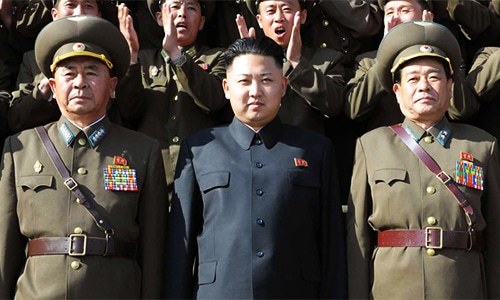NEW DELHI: It was, North Korea insists, a successful test of the “H-bomb of justice”.
“One’s destiny should be defended,” Pyongyang declared in a statement issued shortly after the Wednesday blast, saying it had “proudly joined the advanced ranks of nuclear weapons states”.
But as a chorus of experts heaped doubt on North Korea’s claims to having tested a hydrogen bomb, the question remains: when will we know for certain what Pyongyang exploded in its nuclear testing site, hidden away in a heavily wooded valley? Maybe never.
Dozens of monitoring stations around the world, most overseen by the Comprehensive Nuclear-Test-Ban Treaty Organization, have been on alert since the first seismic waves were detected on Wednesday morning, sniffing the air for radioactive material that can reveal so much about nuclear weapons tests. In addition, the United States and Japan have specially modified aircraft that can fly closer to the testing site, or follow winds carrying explosive residue, to pick up even more radioactive traces.
At least three US intelligence-gathering aircraft left a US air base on Thursday on the Japanese island of Okinawa, though it wasn’t clear if they were investigating the North Korean explosion. The Japanese media has reported that Tokyo mobilised its own aircraft over the Sea of Japan to collect atmospheric data, but that no radioactive material had been detected so far.
That is not surprising. North Korea is careful to keep under wraps the technical details of its nuclear programme, conducting tests deep underground in sealed tunnels. While radioactive gases almost certainly escaped from the underground test site, the radioactive dust that scientists normally need to distinguish a hydrogen bomb explosion from less powerful atomic blasts — like North Korea’s three previous nuclear tests — may not reach the atmosphere.
Since hydrogen bombs detonate in two distinct stages, scientists use a series of complex measurements of the radioactive dust, including calculating the remaining nuclear fuel from the primary explosion, to distinguish hydrogen bombs from atomic bombs. With gases, researchers measure the amounts of certain radioactive materials, particularly various forms of xenon, to determine such things as whether the bomb was fuelled by plutonium or highly enriched uranium.
Making things more difficult, many of the key radioactive isotopes break down quickly, making it difficult, after days or weeks, to determine the particulars of a nuclear test. Gases were not detected from the 2013 North Korean test for more than seven weeks, researchers say, making it impossible to answer many questions about the bomb. “You’re fighting time,” said Ferenc Dalnoki-Veress, a physicist at the James Martin Center for Nonproliferation Studies at the Middlebury Institute for International Studies in Monterey, California.
Researchers say it will be at least a week, and probably longer, until details begin emerging. But whether those details will show that North Korea tested a hydrogen bomb, and now wields those immensely powerful weapons, is unknown.
Most analysts believe it is highly unlikely that North Korea detonated a hydrogen bomb, though some think it may have tested a so-called “boosted” bomb, a hybrid weapon with an explosive power in between a hydrogen bomb and an atomic weapon. “We may just not know for sure” what sort of bomb was tested, said Joel Wit, a former State Department official and founder of the North Korea-focused 38 North website, based at the US-Korea Institute at Johns Hopkins University’s School of Advanced International Studies.
Right now, very little is certain. Especially when it comes to tiny pieces of radioactive dust. “My understanding is that it’s been difficult to pick up particulate matter” in the aftermath of the North Korean nuclear tests, Wit said. But “we were picking up particulate matter for years from the Soviets and their tests were underground”.—AP
Published in Dawn, January 8th, 2016














































